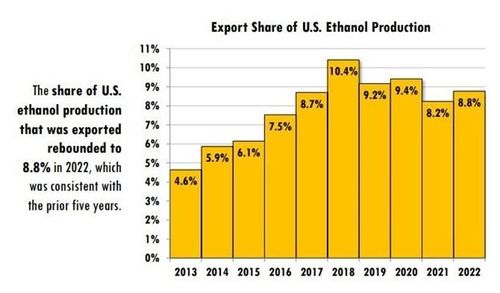RFA: EIA to add ethanol export data to weekly report

SOURCE: Renewable Fuels Association
May 26, 2023
BY Renewable Fuels Association
The Renewable Fuels Association today welcomed an announcement by the U.S. Energy Information Administration that fuel ethanol export estimates will now be included in EIA’s Weekly Petroleum Status Report. Over the past decade, RFA has tirelessly advocated for the inclusion of ethanol export estimates in EIA’s weekly report to provide market participants with a more complete picture of current supply/demand conditions. According to EIA, the June 1, 2023, weekly report will be the first to include ethanol export data.
“This is a critically important improvement to EIA’s Weekly Petroleum Status Report. A major data gap is finally being filled,” said RFA President and CEO Geoff Cooper. “For years, the exclusion of ethanol export data in EIA’s weekly report created uncertainty and put ethanol buyers and sellers at a disadvantage in a competitive marketplace. Historically, ethanol export estimates have lagged other ethanol supply and demand data by 6-8 weeks, leaving market participants in the dark regarding overall ethanol consumption conditions. At long last, EIA is adding the missing puzzle piece to provide the market with a complete picture.”
RFA began pressing EIA to add ethanol export data to the weekly report in 2011, as rising export volumes began to represent a significant component of ethanol’s supply and demand balance. Most recently, RFA’s Chief Economist Scott Richman sent a letter to EIA Administrator Joseph DeCarolis again urging the agency to add weekly ethanol export data. After sustained engagement and communications between RFA, EIA, and other stakeholders over the years, EIA has now secured approval to add ethanol exports to its weekly regime.
Advertisement
Advertisement
“EIA should be applauded for its efforts," Cooper said. "We sincerely thank EIA officials—especially Administrator DeCarolis, Tom Leckey and Mike Conner—for taking our input to heart and working with industry stakeholders to implement this crucial enhancement to the weekly report. EIA’s weekly report will now provide stakeholders around the world what they’ve been looking for—a comprehensive picture of ethanol supply and demand conditions.”
As a percentage of ethanol production, ethanol exports have nearly doubled over the last decade, from 4.6 percent in 2013 to 8.8 percent in 2022, with a high of 10.4 percent in 2018. Click here for our annual export trade statistics summary report.
Advertisement
Advertisement
Related Stories
U.S. fuel ethanol capacity fell slightly in April, while biodiesel and renewable diesel capacity held steady, according to data released by the U.S. EIA on June 30. Feedstock consumption was down when compared to the previous month.
XCF Global Inc. on July 8 provided a production update on its flagship New Rise Reno facility, underscoring that the plant has successfully produced SAF, renewable diesel, and renewable naphtha during its initial ramp-up.
The U.S. exported 31,160.5 metric tons of biodiesel and biodiesel blends of B30 and greater in May, according to data released by the USDA Foreign Agricultural Service on July 3. Biodiesel imports were 2,226.2 metric tons for the month.
The USDA’s Risk Management Agency is implementing multiple changes to the Camelina pilot insurance program for the 2026 and succeeding crop years. The changes will expand coverage options and provide greater flexibility for producers.
EcoCeres Inc. has signed a multi-year agreement to supply British Airways with sustainable aviation fuel (SAF). The fuel will be produced from 100% waste-based biomass feedstock, such as used cooking oil (UCO).
Upcoming Events










